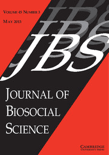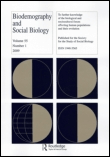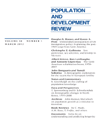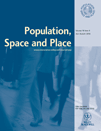
POPULATION RESEARCH AND POLICY REVIEW
metrics 2024
Bridging Research and Policy for a Sustainable Future
Introduction
Population Research and Policy Review is a prestigious journal published by Springer, specializing in the fields of demography and policy analysis. Established in 1982, this journal has developed a significant reputation within the academic community, currently holding a Q1 ranking in Demography and a Q2 ranking in Management, Monitoring, Policy, and Law as of 2023. With a robust Scopus ranking of #34 out of 139 in Demography and a readership that spans multiple disciplines, this journal serves as a critical platform for researchers, professionals, and policymakers to disseminate their findings and insights related to population dynamics and policy implications. Although not an open-access journal, Population Research and Policy Review provides vital research that influences both theoretical frameworks and practical applications in social sciences and environmental management. The journal’s ongoing commitment to high-quality, peer-reviewed scholarship makes it an indispensable resource for those seeking to understand and address contemporary demographic challenges.
Metrics 2024
 0.85
0.85 2.60
2.60 2.70
2.70 59
59Metrics History
Rank 2024
Scopus
IF (Web Of Science)
JCI (Web Of Science)
Quartile History
Similar Journals

JOURNAL OF BIOSOCIAL SCIENCE
Unraveling the Complex Ties Between Biology and SocietyJOURNAL OF BIOSOCIAL SCIENCE, published by Cambridge University Press, is a pivotal interdisciplinary journal dedicated to advancing our understanding of the complex interplay between biological and social factors in human health and society. With an ISSN of 0021-9320 and an E-ISSN of 1469-7599, this journal has been a cornerstone of scholarly communication since its inception in 1969, paving the way for innovative research until 2024 and beyond. The journal is ranked in the Q3 quartile in Public Health, Environmental and Occupational Health and Q2 in Social Sciences (miscellaneous), reflecting its significant impact in these fields. Its Scopus ranking further emphasizes its relevance, sitting at #79 out of 275 in General Social Sciences and #334 out of 665 in Public Health. Researchers, professionals, and students are encouraged to explore the journal's rich repository of articles that delve into critical biosocial issues, fostering a deeper understanding of how social structures influence health and well-being. Although not open access, the journal remains an essential resource for those committed to addressing contemporary health challenges through a biosocial lens.

POPULATION AND ENVIRONMENT
Bridging Population Dynamics and Environmental ChangePopulation and Environment is a renowned journal published by Springer, focusing on the critical intersection between demographic processes and environmental changes. Established in 1980, the journal has become a leading platform for interdisciplinary research, with its impressive impact reflected in its 2023 rankings, placing it in the Q1 quartile for both Demography and Environmental Science (miscellaneous) categories. With Scopus Ranks highlighting its prominent position (#11 out of 139 in Social Sciences – Demography, and #46 out of 219 in Environmental Science), Population and Environment fosters a rich dialogue among researchers, professionals, and students dedicated to understanding how population dynamics influence environmental conditions and vice versa. Operating without an open access option, the journal ensures high standards for scholarly contributions and remains committed to bridging knowledge gaps in the realms of population studies and environmental science. The journal's rigorous peer-review process and comprehensive archive from 1980 to 2024 solidify its reputation as an invaluable resource for advancing research and informing policy in these critical fields.

Biodemography and Social Biology
Pioneering Research at the Intersection of Biology and AnthropologyBiodemography and Social Biology is a distinguished academic journal published by Routledge Journals, Taylor & Francis Ltd, focusing on the intersections of demographic and biological sciences. With its ISSN 1948-5565 and E-ISSN 1948-5573, this journal contributes significantly to the fields of anthropology, demography, and social biology, making it an essential resource for researchers and professionals alike. The journal has consistently achieved high rankings, notably placing in Q2 in both anthropology and demography, underlining its impact in these critical areas of study. Although it does not provide Open Access options, the journal's rigorous peer-review process ensures the highest quality of academic discourse and research dissemination. Covering a wide scope of topics related to human population dynamics, health, and behavior, Biodemography and Social Biology serves as a vital platform for advancing knowledge and understanding of the biological and social factors influencing human societies since its inception in 1990. Researchers, students, and professionals are invited to contribute their findings and insights, enriching the academic conversation that this journal fosters.

Population Review
Illuminating Trends in Sociological DemographyPopulation Review, published by Sociological Demography Press, is a vital resource in the field of demography, contributing to the understanding of population dynamics and trends since its inception in 1988. With an ISSN of 1549-0955 and an E-ISSN of the same number, the journal has played a significant role in disseminating scholarly research and analysis relevant to demographic changes and their implications. Although currently categorized in the Q4 quartile, it ranks 78th out of 139 in the Scopus Social Sciences: Demography category, placing it within the 44th percentile among its peers. This journal serves as a platform for researchers, professionals, and students to engage with contemporary population issues, encouraging the exploration of new theories and methodologies. While not available as open access, its robust editorial standards and commitment to rigorous research make it an invaluable addition to the libraries of demographers and social scientists alike.

POPULATION AND DEVELOPMENT REVIEW
Inspiring Insights into the Future of Population and Development.Population and Development Review is a prestigious academic journal published by Wiley, recognized for its comprehensive exploration of the intersections between population dynamics and development processes. Since its inception in 1976, the journal has contributed significantly to the field, featuring rigorous peer-reviewed articles that address pressing issues in demography, development, and sociology, maintaining a commendable reputation with a Q1 ranking across multiple categories as of 2023. With an impact factor that reflects its influence—ranking in the 90th percentile in Sociology and Political Science, and 85th percentile in Development—this journal serves as a vital resource for researchers, policy-makers, and students alike. It is instrumental in fostering dialogue and disseminating knowledge that shapes and informs public policy and academic inquiry. Although not an open-access publication, it remains accessible through various academic institutions, ensuring that its valuable insights are available to a broad audience eager to engage with the complexities of population and development.

Population Space and Place
Shaping the Future of Population StudiesPopulation Space and Place is an esteemed academic journal published by WILEY, dedicated to advancing the fields of demography and geography, planning, and development. With an impressive 2023 impact factor and categorized in the top quartile (Q1) for both demography and geography, this journal serves as a vital platform for researchers, professionals, and students seeking to explore the spatial dimensions of population dynamics. Founded in 2004 and running through 2024, it has established itself as a significant contributor to scholarly discussions, evidenced by its high Scopus rankings, including rank #18 out of 139 in demography and #165 out of 821 in geography and planning. While the journal currently does not offer open access, it remains a key resource for those involved in academic research and policy formulation. With its focus on the interplay between population trends and spatial analytics, Population Space and Place is essential for anyone aiming to understand the complexities of population geography in a rapidly changing world.

Papeles de Poblacion
Fostering understanding through open-access research.Papeles de Población, published by the Universidad Autónoma del Estado de México, is a prominent open-access journal that has been advancing the field of demography since its inception in 1997. With an ISSN of 1405-7425, this journal aims to foster a deeper understanding of population studies through research articles, reviews, and critical analyses that address the complex dynamics of demographic changes, social structures, and their implications. While currently ranked in the fourth quartile of its category in 2023, it serves as a significant channel for researchers, professionals, and students to disseminate and access cutting-edge findings. Open access since 2004, it provides a platform for broader readership and knowledge sharing, thus contributing to the global discourse on population issues. Based in Mexico, the journal is committed to embracing diverse perspectives, emphasizing the importance of regional studies within a global context.

Demografie
Advancing insights into population dynamics and trends.Demografie is a distinguished academic journal published by the Cesky Statistical Office in the Czech Republic, serving as a vital platform for scholars and practitioners interested in the multifaceted field of demography. Established in 1976 and consistently contributing until 1999, with a renewed focus from 2014 to 2024, this journal engages with critical issues such as population dynamics, migration patterns, and socio-economic factors influencing demographic changes. For its impactful research contributions, it holds a Q3 category ranking in Demography for 2023, with a Scopus rank of #89 out of 139 in the Social Sciences category, reflecting its credibility and relevance in the field. Although it operates under traditional access, its insightful articles and comprehensive analyses remain valuable resources for researchers, professionals, and students eager to deepen their understanding of demographic trends and policies. The journal's commitment to advancing demographic knowledge makes it an essential read for those navigating the complexities of population studies.

Spatial Demography
Unlocking Population Patterns through Spatial DataSpatial Demography is a vital academic journal published by Springer International Publishing AG, focusing on the intersection of spatial analysis and demographic research. With its ISSN 2364-2289 and E-ISSN 2164-7070, this journal aims to advance understanding of population dynamics through innovative methodologies and spatially explicit data, offering a platform for researchers, professionals, and students engaged in demography, geography, and urban studies. While it does not currently operate under an open access model, Spatial Demography maintains a rigorous peer-review process to ensure high-quality publications that contribute significantly to the field. Given the growing importance of spatial data in demographic research, the journal serves as an essential resource for those looking to explore how spatial attributes influence demographic processes and patterns worldwide. The official address of the publisher is Gewerbestrasse 11, Cham CH-6330, Switzerland.

GENUS
Innovating the Study of Populations for a Global AudienceGENUS is a prestigious open-access journal published by SpringerNature, dedicated to advancing research in the field of demography. With an E-ISSN of 2035-5556, it has been operating as an open-access platform since 2016, ensuring that valuable demographic knowledge is accessible to a global audience. Located in Switzerland, this journal contributes significantly to the scholarly community, achieving a remarkable Q1 ranking in the 2023 Scopus category for Social Sciences focusing on Demography, where it stands at an impressive Rank #12 out of 139, placing it in the 91st percentile. With a history that spans several decades, starting from 1970 and including comprehensive coverage from 2007 to 2024, GENUS provides a vital forum for researchers, professionals, and students seeking to engage deeply with current demographic studies. This journal not only publishes cutting-edge research but also facilitates fruitful discussions on key demographic trends and policies, making it an essential resource for anyone interested in the social sciences.